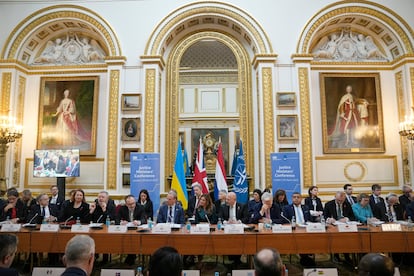Millions in extra funding pledged for International Criminal Court work in Ukraine
A conference in London raised $4.9 million to support the ICC in its investigations into alleged war crimes in Ukraine and its work to hold Russia to account

An international conference in London raised 4 million pounds ($4.9 million) to support the International Criminal Court in its investigations into alleged war crimes in Ukraine and its work to hold Russia to account, officials said Monday.
Justice ministers from over 40 countries met in London for the war crimes conference days after the global court issued an arrest warrant for Russian President Vladimir Putin, accusing him of personal responsibility in the abduction of children from Ukraine. Friday’s move was the first time the court has issued a warrant against a leader of one of the five permanent members of the U.N. Security Council.
“We share the belief that President Putin and the wider leadership must be held to account,” Britain’s Justice Secretary Dominic Raab said as he opened the meeting. “Let’s make sure that we back up our words with deeds, that we back up our moral support with practical means to effectively investigate these awful crimes.”
Karim Khan, the prosecutor of the International Criminal Court, said the warrant for Putin was not a moment of triumph but a “somber occasion” reminding the world that joint international action is key to delivering justice for Ukraine.
“If we don’t at this moment of world affairs cling to the law, if we don’t look at ourselves and ask how we can do better… we will not only miss an opportunity but we may not have further opportunities,” Khan said.
Monday’s conference drummed up extra international funding for the ICC, as well as other offers of resources from European countries including investigative support and forensic expertise, Raab said.
The global court on Friday also issued a warrant for the arrest of Maria Lvova-Belova, the commissioner for Children’s Rights in the Office of the President of the Russian Federation.
Andriy Kostin, prosecutor-general of Ukraine, described the abduction and transport of thousands of Ukrainian children to Russia to be adopted and raised as Russians as part of a “clear plan” by Russia to “destroy Ukraine and Ukrainian identity.”
His office has already launched investigations into over 72,000 incidents of war crimes in his country, he said, adding that no single day goes by without “widespread and systemic atrocities” committed in residential areas against civilians.
Kostin also urged world leaders to back the establishment of a special international tribunal in order to investigate and prosecute Russia’s leaders for the broader crime of aggression. The European Union, among others, have supported the idea, but there is no international agreement on the matter so far. Some are concerned that such a tribunal could undermine the ICC’s mandate.
The arrest warrant against Putin may damage his international standing, but its practical implications are likely limited, not least because Moscow does not recognize the court’s jurisdiction or extradite its nationals. Russian officials dismissed the ICC’s move as “legally null and void.”
Asked whether he believed it likely that Putin will one day stand trial, Khan said the ICC’s record isn’t perfect — but that it has successfully convicted leaders including Liberian President Charles Taylor for crimes in Sierra Leone.
“Those that think they have a free pass or that there’s no consequences need to realize that the law is out there,” the prosecutor told Sky News.
Sign up for our weekly newsletter to get more English-language news coverage from EL PAÍS USA Edition
Tu suscripción se está usando en otro dispositivo
¿Quieres añadir otro usuario a tu suscripción?
Si continúas leyendo en este dispositivo, no se podrá leer en el otro.
FlechaTu suscripción se está usando en otro dispositivo y solo puedes acceder a EL PAÍS desde un dispositivo a la vez.
Si quieres compartir tu cuenta, cambia tu suscripción a la modalidad Premium, así podrás añadir otro usuario. Cada uno accederá con su propia cuenta de email, lo que os permitirá personalizar vuestra experiencia en EL PAÍS.
¿Tienes una suscripción de empresa? Accede aquí para contratar más cuentas.
En el caso de no saber quién está usando tu cuenta, te recomendamos cambiar tu contraseña aquí.
Si decides continuar compartiendo tu cuenta, este mensaje se mostrará en tu dispositivo y en el de la otra persona que está usando tu cuenta de forma indefinida, afectando a tu experiencia de lectura. Puedes consultar aquí los términos y condiciones de la suscripción digital.








































